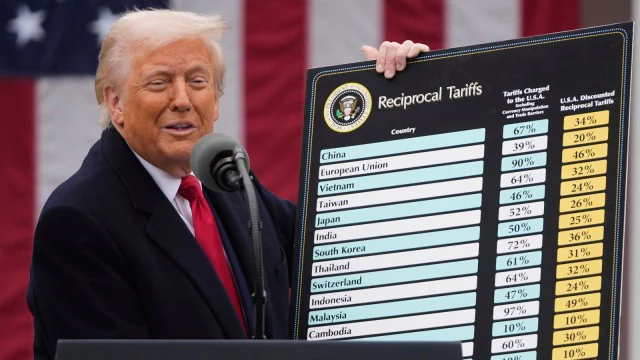US President Donald Trump’s new tariffs have led to a dramatic $760 billion loss in market value for major tech companies, including Apple, Microsoft, Alphabet, Amazon, Tesla, Nvidia, and Meta. Apple was hit hardest, with its stock dropping nearly 6% in after-hours trading, while other tech giants also faced significant declines. The tariffs, designed as a “declaration of economic independence,” involve a 10% blanket tariff on imports and higher duties for countries imposing tariffs on US exports. This move has sparked concerns over the impact on global supply chains and domestic industries.

The recent announcement of substantial tariffs by US President Donald Trump has caused significant disruption in the stock market, with major technology companies taking the hardest hit. In a matter of hours, the combined market value of key tech firms, including Apple, Microsoft, Alphabet (Google), Amazon, Tesla, Nvidia, and Meta (Facebook’s parent company), plummeted by a staggering $760 billion.
Among the most affected was Apple, which saw its stock plummet nearly 6% in after-hours trading. If these losses carry over into regular trading, it would mark the company’s largest single-day decline since September 2020. Apple’s heavy reliance on manufacturing in China and other Asian countries, coupled with tariffs as high as 54% on imports from China, played a significant role in its downturn.
Other tech giants were not spared. Nvidia’s stock dropped by 4% due to concerns about its operations in Taiwan, where the company manufactures chips. Tesla’s shares also fell by 4.5% in after-hours trading, while Alphabet, Amazon, and Meta saw declines between 2.5% and 5%. Microsoft, though less affected, still experienced a nearly 2% drop.
Trump’s tariffs, which are designed to be a “declaration of economic independence” for the United States, involve a blanket 10% tariff on all imports, with higher duties on goods from countries that impose tariffs on US exports. The President framed these measures as a way to strengthen domestic production, open foreign markets, and lower consumer prices by fostering greater competition.
This significant market shake-up highlights the volatility and uncertainty created by the tariff strategy, particularly for tech companies heavily dependent on global supply chains.











